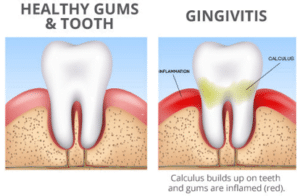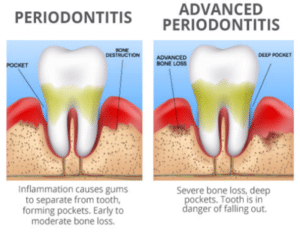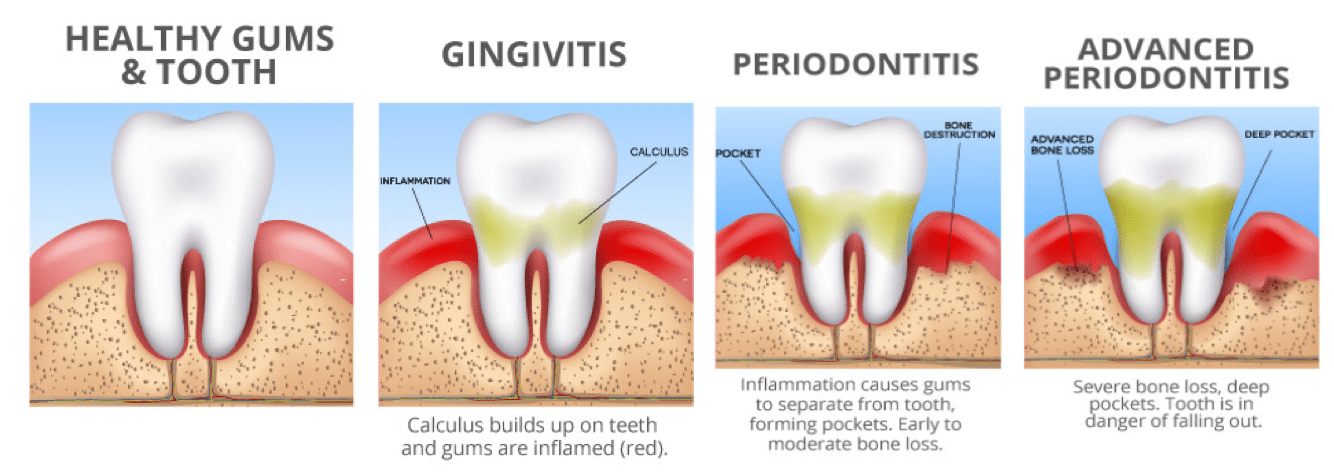By Dr Tharini Hettiarachchi
Have you heard the term gum disease and wondered exactly what that means? Some common concerns from patients with gum disease at their initial appointment are:
- “My gums bleed with I brush and floss, is that normal?”
- “I have a sore, wobbly tooth”
- “A large piece came off my tooth and there is a bad smell”.
Gum disease or periodontal disease is broken down into two types: gingivitis and periodontitis. It effects the structures that support your teeth, such as your gums and bone. These form the foundation of your healthy teeth. Before a house is built, one must ensure the foundation is sound first. Similarly, your gums and bony support need to be stable prior to working on your teeth.
Gingivitis
Gingivitis is the early stage of gum disease. If the teeth aren’t brushed or flossed regularly or efficiently, a layer of germs form on the teeth. This layer is called plaque and if left for too long, it can form a hardened plaque layer called tartar or calculus. This leads of inflammation of your gums, called gingivitis.
The main signs of gingivitis are bleeding gums and visual plaque or calculus build up. Gum disease can be reversible at this stage by adopting regular oral hygiene habits and regular professional cleans.

Periodontitis
When gum disease progresses and worsens, it is called periodontitis where irreversible damage has occurred to the supporting structures of your teeth. This can cause bone loss around your tooth and deep gum pockets can form around the tooth trapping germs. With the lack of support, the teeth can ultimately get loose. All of which can make it more difficult to manage your gum health. At this point your dentist will refer you to an experienced gum specialist (Periodontist). Although the condition is irreversible, regular professional maintenance can help manage the disease.
It is a slowly destructive disease and often not painful. Patients are often unaware until they notice gaps between the teeth, teeth movement or loose teeth. By this stage, periodontitis is often left uncontrolled for decades and it has progressed to advanced periodontitis and the best option may only be extraction and replacement of your teeth.
There is also a hereditary component to periodontitis, which means your genetics also play a part. This means that it isn’t just a one time fix at the dentist. It will require lifelong maintenance. Regular professional cleans are required, as well as adopting effective brushing and flossing habits at home.
Periodontitis may be mild, moderate or severe. Management can range from scaling and root planning of the teeth, to the prescription of antibiotics, or surgical treatment for a more thorough clean or to help heal bone or gums that have been destroyed. More severe cases will likely require tooth removal.

Diabetes and periodontitis
The relationship between diabetes and periodontitis goes both ways. Poorly controlled diabetics have high blood sugar levels which can make fighting gum infections difficult, leading to difficulty to control gum disease. Reversely, those with gum disease, will find it harder to control their blood sugar levels.
If you have diabetes, work with your medical practitioner to control your blood sugar levels through exercise, good eating, a healthy lifestyle and medications where required. Ensure you are seeing your dentist 6 monthly to check and manage your gum health.
Smoking and periodontitis
Smoking can increase the risk of gum disease and may lead to worsening of your gum health. Smoking hinders healing in your mouth, which can make it harder to fight gum infections and make treatment more difficult. It can also lower the chances for successful treatment. How many you smoke a day, and how long you have been smoking can greater your risk of gum disease.
Here are some things to look for where gum disease is involved:
- Do your gums bleed when your brush or floss?
- Do you have a bad taste or smell in your mouth?
- Have you noticed gaps between your teeth?
- Do your gums look like there are pulling away from your teeth (receding gums)?
- Do your teeth move or feel wobbly?
- Have you noticed pus, swelling or tenderness from the gums?
If your answer is “yes” to any of the above questions, book a consult with your dentist to start managing your gum health. You may require a referral to a periodontist to ensure you are getting the best management.
Some general take-home tips to ensure you are on top of the gum health!
- Brush your teeth twice daily, with a soft manual toothbrush or a powered toothbrush.
- Floss your teeth at least once daily
- Book in for professional dental cleans regularly – at least 6monthly unless determined sooner by your periodontist or dentist
- Manage your diabetes with your general medical practitioner, alongside a healthy lifestyle, diet and exercise.
- Contact your Health Practitioner about your path to smoking cessation. Consider calling the Quitline on 13QUIT for more options and guidance. (healthier.qld.gov.au/support/13quit)
If you are looking for an Ipswich Dentist, don’t put it off any longer and call our friendly staff at Raceview Dental on 3202 4566 for a consult if you are concerned about you gum health or due for your 6 monthly comprehensive check-up and clean.

